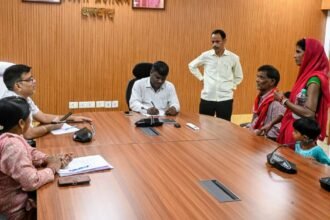Dhanbad, October 17, 2024 – The Indian Institute of Technology (Indian School of Mines), Dhanbad, has initiated a three-day workshop focusing on the emerging field of photonics biosensing applications. The event, which commenced today, has brought together experts from premier technical institutes and research laboratories across India to explore the latest developments and future possibilities in photonics technology.
The workshop aims to provide a platform for knowledge exchange, technical discussions, and collaboration on photonics applications, particularly in the healthcare and environmental sectors.
Photonics Biosensing Workshop Brings Together Experts Across India
The workshop, titled “Photonics Biosensing Applications,” is a collaborative event featuring renowned academics, researchers and industry professionals. It is designed to facilitate the exchange of ideas and advancements in photonics-based biosensing technologies.
Participants from various technical institutions and research organizations are in attendance, discussing the integration of photonics with biological systems to create innovative solutions for real-world problems.
The event commenced with an inaugural address by Prof. M.K. Singh, who emphasized the need for continuous research and development in the field of photonics. According to Prof. Singh, “There is a significant difference between merely acquiring information and gaining knowledge. It is essential to transform information into knowledge through persistent efforts, and workshops like this are crucial for fostering such understanding.”
Key Discussions on Environmental and Healthcare Applications
During the workshop, the discussions have centered around the application of photonics technology in environmental monitoring and healthcare. Experts presented the concept of integrated optical biosensors, which can detect environmental pollutants, as well as photonic technology-based sensors designed to monitor health conditions.
These sensors have the potential to revolutionize diagnostics by providing faster and more accurate results.
Dr. Srinivas Talabattula from IISc Bangalore, one of the keynote speakers, highlighted the importance of self-learning in advancing research. “The first step towards gaining knowledge is self-learning, which involves reading books, surfing relevant websites and engaging with comprehensive materials,” he noted.
He also advocated for forming dedicated committees at the institutional level to streamline research and promote interdisciplinary collaborations.
The Importance of Photonics Technology in Biosensing
Photonics technology leverages light-based processes to detect and analyze biological samples. This method has proven to be highly effective for a range of biosensing applications due to its speed, accuracy, and sensitivity.
Researchers have developed photonics-based tools that can detect minute changes in biological samples, making it a valuable technology for medical diagnostics, environmental testing, and even food safety.
Throughout the workshop, experts discussed the advantages of integrated photonic systems for developing portable and cost-effective diagnostic tools. These tools are particularly useful in resource-limited settings, where traditional diagnostic equipment may not be accessible.
Expert Insights: Knowledge Sharing and Research Opportunities
The workshop has created a platform for knowledge sharing among participants. Prof. Ravi Kumar Gangwar, Head of the Department of Electronics Engineering at IIT ISM, provided an overview of the department’s infrastructure, its history, and the various courses offered. He highlighted how the department’s cutting-edge research is contributing to the advancement of photonics technology.
In his address, Prof. Sanjeev Kumar Raghuvanshi, Associate Professor in the Electronics Engineering Department and the program coordinator, detailed the workshop’s itinerary. “The primary objective of this workshop is to bring together leading minds in the field of photonics biosensing. By sharing research, we can accelerate the development of innovative solutions that can be applied in diverse fields,” he said.
Participants have been engaging in discussions on the integration of photonics sensors for various uses, such as monitoring air and water quality, detecting toxins, and even aiding in medical diagnostics for conditions like urinary tract infections (UTIs). Prof. Singh also encouraged exploring the application of photonics in the treatment of UTIs, showcasing the versatility of this technology.
Official Statements on the Importance of the Workshop
The significance of the workshop has been echoed by many participants. In his statement, Prof. M.K. Singh remarked, “Workshops are an essential part of outreach activities. They play a critical role in bridging the gap between teaching, research, and development. By bringing experts together, we can transform information into practical knowledge that leads to innovation.”
Similarly, Dr. Srinivas Talabattula emphasized the role of collaboration and committee formation at the institutional level to further photonics research. He pointed out that interdisciplinary cooperation is vital for the successful development and implementation of advanced photonic biosensing technologies.
Prof. Ravi Kumar Gangwar stressed the need for continuous engagement in such workshops to stay updated with the latest trends and developments. “The field of photonics is ever-evolving, and keeping pace with new research is essential for the future of technology. This workshop exemplifies how academic and industry collaboration can drive progress,” he said.
The Broader Impact of Photonics Biosensing Applications
Photonics biosensing has vast potential across multiple sectors. In healthcare, it enables early disease detection and real-time monitoring, offering solutions that are faster and more accurate than traditional methods.
This technology can lead to the development of wearable biosensors that continuously monitor patients’ health conditions, providing immediate feedback and enabling timely medical interventions.
In environmental science, photonics sensors can detect pollutants at trace levels, making them invaluable for monitoring air and water quality. This ensures a safer and healthier environment by enabling quick responses to pollution outbreaks.
Additionally, these sensors have applications in the agricultural sector for soil analysis and crop monitoring, ensuring sustainable farming practices.
As highlighted in the workshop, the potential for future growth in photonics technology is immense. Through continued research and collaborative efforts, it is possible to develop solutions that address some of the most pressing challenges in healthcare, environmental safety, and beyond.
Conclusion
The three-day workshop on Photonics Biosensing Applications at IIT ISM, Dhanbad, marks a significant step forward in the field of photonics technology. By bringing together experts from diverse fields, the workshop fosters an environment of learning, collaboration and innovation.
As the event progresses, it is expected that more insights and breakthroughs will emerge, paving the way for the advancement of photonics biosensing in various critical sectors.
With photonics technology continuing to evolve, workshops like this provide a crucial platform for academics, researchers and industry professionals to share knowledge, develop practical applications and contribute to future technological advancements.
The event at IIT ISM exemplifies how collaborative efforts can lead to innovative solutions that make a tangible difference.
Stay Updated with the Latest News in Jharkhand!
Be the first to know every important news, from Jharkhand Politics to Jharkhand News. We keep you prepared for every moment. Follow us for Breaking News in Jharkhand and never miss out on Jharkhand Trending Topics!
Stay connected with Jharkhand Headlines!






